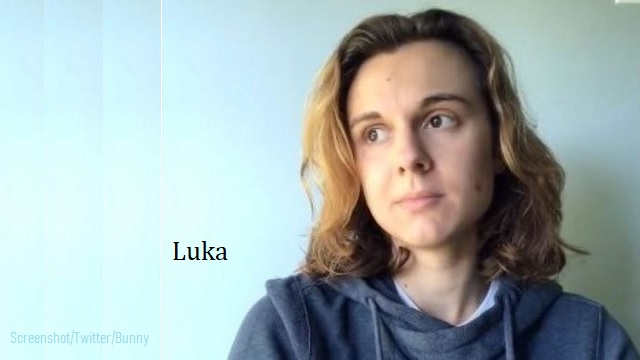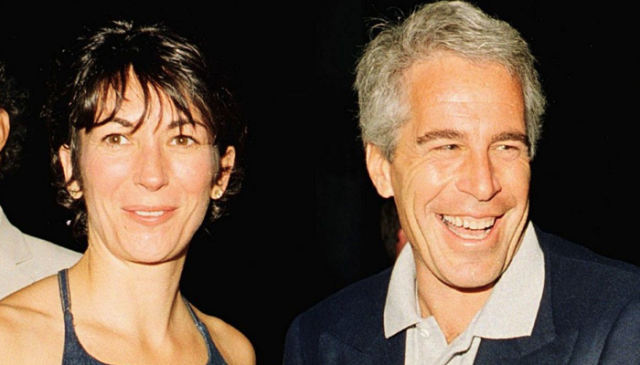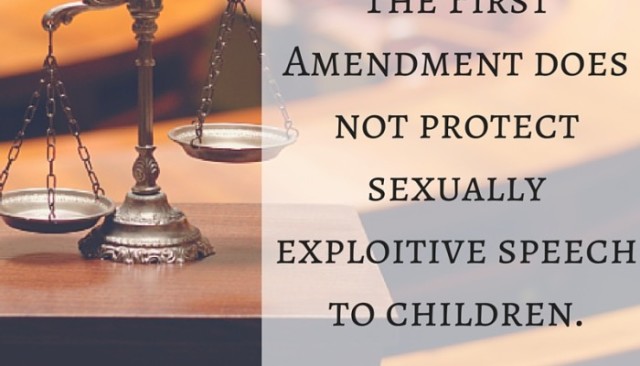‘Groomed And Preyed Upon’: Young Woman Was Pressured Into Mastectomy, Testosterone As A Child — Now She Regrets It

- Luka, a 20-year-old woman who began identifying as transgender in adolescence, now regrets taking cross-sex hormones and having a double mastectomy at 16; she says doctors pressured her into medically transitioning.
- Her story is a microcosm of what’s happening across the U.S.: thousands of teen girls are undergoing irreversible biomedical interventions to resolve gender identity issues they would likely outgrow on their own, experts say, and doctors are encouraging the medicalization of these minors despite health risks the treatments present.
- “My parents were told the same thing so many other parents in these situations are told, ‘Would you rather have a dead daughter or a living son?’ despite the fact that, no matter all my mental health struggles, I had never been suicidal,” Luka told the Daily Caller News Foundation.
Luka was 15 when she was first encouraged by her therapist to come out as transgender while she was hospitalized for mental health issues. A surgeon removed her breasts when she was 16 in a “gender-affirming” double mastectomy, and she went on cross-sex hormones soon after, which permanently changed her face, body and voice.
At 20 years old, Luka now regrets listening to doctors and medical professionals, whom she says misled and manipulated her into undergoing irreversible medical procedures.
“There was no stopping to question if this was the right way to deal with the discomfort I was feeling around my body,” Luka told the Daily Caller News Foundation.
At no point did doctors inform Luka that there were ways to resolve her mental health problems besides transitioning, which she now believes would have been enough to prevent her from going through with the procedures, she told the DCNF. Her doctors appear to have adopted the “gender affirmation approach” promoted by transgender activists: they encourage gender transitions rather than helping patients come to terms with their biological sex.
“The only acceptable answer to any medical professional was to ‘affirm’ what I said instead of offering any alternative ways of dealing with the issues I was suffering from. Those constant affirmations really did push me down the path of further medicalization,” said Luka, whose last name has been withheld to protect her privacy.
Luka is one of a handful of “detransitioners” speaking out against what they see as a medical establishment run amok, committed more to transgender ideology than patient well-being; their fears are backed up by a growing body of experts who believe the medical community is pushing minors onto the gender medicalization path to alleviate normal adolescent woes they would likely outgrow. Luka is sharing her story now in the hope that girls who find themselves thrust into the transgender medical world will slow down and reconsider before socially or medically transitioning.
“According to all the studies ever carried out on gender-distressed children, 80% of these kids grow out of it,” said Stella O’Malley, psychotherapist and founder of Genspect, an organization that is skeptical of the efficacy of the “gender affirmation” approach to gender dysphoria.
Numerous studies have shown similar figures.
“It’s very authoritarian of clinicians to pretend to know which child will persist in their trans identity and which will desist,” O’Malley said. “The rising numbers of detransitioners who transitioned when they were children shows that these clinicians are no less fallible than every other human.”
“We have no way of knowing what sort of adult the child will become and we shouldn’t allow clinicians with an inflated sense of their abilities to have this authority,” she told the DCNF.
The DCNF confirmed the details of Luka’s transition through a review of medical documents and photographs. The names of the clinics and medical professionals involved in her transition have been withheld at her request due to her fear of possible retaliation.
A therapist first encouraged Luka to come out as transgender while she was partially hospitalized for unrelated mental health issues at age 15, as a freshman in high school, she said; this meant she was sleeping at home but spending most days at the hospital. She had expressed general discomfort with her body and said she might be questioning her gender identity, and her therapist told her to come out as transgender to her parents, claiming it was the best way the get the help she needed, Luka told the DCNF.
Luka had only met with that therapist once or twice on a one-on-one basis prior to that meeting, she said. During that therapy session, Luka said she was overwhelmed, shaking with anxiety and nearly blacked out. Afterwards, her parents were told that she was at high risk for suicide if she didn’t transition — a common talking point among transgender activists, politicians and some health care professionals.
“I cannot stress enough how I was not in a good place mentally at that point in time,” she said. “I’d say that first visit to the partial hospital definitely solidified that identity of transgender in me and started that process of social (and later medical) transition, since up until that point I was questioning but hadn’t put any label on myself yet.”
“It was only rather recently after I really was able to take a large step back from having direct interactions with those medical professionals that I was able to process everything and really work through the actual causes of my dysphoria and general discomfort,” she told the DCNF.
I was 16. NEVER let anyone tell you this isn’t happening. #detrans #detransition #detransitioner #ProtectOurChildren pic.twitter.com/OwLe92IytQ
— Luka “Bunny” Hein (@onedonebun) November 9, 2022
Soon after adopting a transgender identity, Luka moved from her all-girls school to a public school, where she began wearing chest binders and going by a new name. Transgender activists refer to this process as “social transition.”
While activists claim the practice is easily reversed, critics say that social transition further confuses children and cements transgender identification.
“Social transition has a critical effect on [transgender identification’s] persistence,” wrote Dr. Stephen B. Levine, a Distinguished Life Fellow of the American Psychiatric Association, in his expert witness statement in a court case over transgender participation in school sports. “It is evident from the scientific literature that engaging in therapy that encourages social transition before or during puberty … is a psychotherapeutic intervention that dramatically changes outcomes.”
“Studies conducted before the widespread use of social transition for young children reported desistance rates in the range of 80-98%, [while] a more recent study reported that fewer than 20% of boys who engaged in a partial or complete social transition before puberty had desisted when surveyed at age 15 or older,” he wrote.
This thread is very important to me. If you could take a minute or two to listen I’d much appreciate it. #detransition #detrans 1/2 pic.twitter.com/8WCiW2G8sM
— Luka “Bunny” Hein (@onedonebun) November 3, 2022
After Luka’s social transition came the more invasive, irreversible treatments.
A therapist she was seeing at her gender clinic recommended she visit a plastic surgery center, she said. Luka did, and underwent a double mastectomy at 16 years old, about a year and a half after “coming out” as transgender. No one at the clinic seemed to have any hesitations about Luka’s age, she said, and the purpose of her appointments prior to surgery were simply to get familiar with the clinic, not to determine if surgery was actually right for her.
“The doctors themselves seemed to have no hesitation about the surgery,” Luka said, noting that the surgery was delayed a few months due to concerns about her mental health and recovery timing. “The initial consultation at the gender identity clinic was around two hours just asking how I felt about things related to gender.”
Double mastectomies, often referred to by doctors and transgender activists as “top surgery,” are frequently recommended to underage girls with gender identity issues; numerous hospitals in the U.S. openly perform them on minors, and some surgeons advertise the procedure on youth-dominated social media platforms like TikTok.
Mastectomies can result in loss of nipple sensation, and some patients choose to have the nipples removed entirely, according to Miami-based plastic surgeon Sidhbh Gallagher, who promoted double mastectomies on TikTok.
There’s no comprehensive data on how many minors have received mastectomies in pursuit of gender transitions in the U.S., but Boston Children’s Hospital performed 65 top surgeries on minors from 2017 to 2020, according to data published by the Journal of Clinical Medicine. The average top surgery patient was 18, and the youngest was 15, according to the review.
At least 1,130 chest surgeries were performed on adolescents (98.6% of whom were female) in the U.S. from 2016 to 2019, according to one study conducted by researchers at Vanderbilt University, but this data only includes hospital settings; it doesn’t account for the patients who had surgeries at private practices or the likely higher number of minors who underwent the procedure from 2020 to 2022.
Doctors often recommend patients take testosterone, referred to as “hormone therapy,” before undergoing mastectomies to promote chest muscle growth, according to the Mayo Clinic. However, Luka said she wasn’t prescribed testosterone until after her surgery.
“After getting surgery at 16, getting on hormones later that fall went very quickly,” she said. “I met with my doctor at the gender clinic, had blood work done and got a prescription for testosterone.”
She continued to take testosterone until earlier this year, at the age of 20, when she realized it hadn’t resolved her underlying problems. It had, however, resulted in a long list of health issues, Luka told the DCNF: she stopped getting her period, her voice grew deeper, she began growing facial hair, her jaw became more square, her figure changed from hourglass to rectangular and she developed a deeper voice.
She also said she was unable to cry while taking testosterone, adding that it affected her thought processes in a way that she struggled to describe.
Gender transitions are an off-label use of testosterone that has not been approved by the Food and Drug Administration, and the side effects still aren’t fully known, according to Kaiser Permanente. The drug can result in permanent infertility and carries the risks of high blood pressure, strokes, heart attacks, cancer, liver damage, weight gain and diabetes.
Medical professionals convinced Luka’s parents to allow her to have the procedures, she said, by telling them their daughter might commit suicide if she didn’t medically transition. She doesn’t blame her parents for what happened, and says they were just trusting a medical system that was supposed to help her.
“My mom was very concerned and opposed to the idea of me getting surgery, but was bullied by my dad and pressured by the doctors and therapists into being ok with it,” she said. “My parents were told the same thing so many other parents in these situations are told, ‘Would you rather have a dead daughter or a living son?’ despite the fact that, no matter all my mental health struggles, I had never been suicidal.”
Other detransitioners have come forward with similar stories; one young woman, Chloe Cole, is suing Kaiser Permanente for fraud after the hospital allegedly told her parents that her gender issues would never go away and that she was at high risk for suicide if she didn’t medically transition. After undergoing puberty blockers, hormones and a double mastectomy beginning at age 13, her gender dysphoria did go away; she is no longer transgender and, like Luka, she regrets the procedures.
“Chloe’s doctors coerced her into a life-altering and highly invasive medical treatment by concealing from her less invasive treatment options and by lying to her about her condition,” Harmeet Dhillon, one of Cole’s attorneys, told the DCNF. “This predatory and barbaric behavior from medical professionals needs to stop. ”
Dr. Joseph Burgo, a clinical psychologist, said some medical professionals ignore the various mental health issues young patients may have and instead focus solely on gender dysphoria, viewing their other problems as mere extensions of gender identity issues and the result of discrimination and mistreatment they may face.
“The current term used to describe this very real phenomenon is ‘diagnostic overshadowing,’ where a diagnosis of transgender identity takes precedence over all other mental health issues and becomes the sole focus of treatment,” Burgo told the DCNF. “Some practitioners hold that those other mental issues are caused by so-called ‘minority stress’ (non-acceptance of trans identities by society) and will actually be resolved through medical transition.”
World Professional Association for Transgender Health (WPATH) and the American Academy of Pediatrics support cross-sex medical procedures for minors, which are legal in most states and widely defended by Democratic politicians. However, a growing number of health care professionals are coming out against the procedures, citing health risks and a lack of evidence of their safety and efficacy.
More than 1,700 medical professionals and concerned parents recently signed a declaration condemning WPATH’s guidelines over concerns about ethics, child safeguarding and the group’s alleged mischaracterization of scientific data. WPATH had removed age minimums for many cross-sex procedures, invalidated the experiences of detrantitioners and ignored scientific skepticism of cross-sex procedures to adhere to ideological positions, the declaration argued.
By ceasing her transition and speaking out, Luka joins a growing cohort of young people who adopted transgender identities, underwent cross-sex medical procedures in adolescence and eventually regretted it. These so-called detransitioners are largely female, and they often attribute their gender identity issues to social contagion or to pressure from transgender activists on social media.
“I would definitely say social media played a role in keeping the process of everything going, as well as some issues with being groomed and preyed upon by people online,” she said. “That probably played a much bigger role than any social contagion aspect.”
Transgender activists claim transition regret is rare, but the systematic review they often cite only counted patients who had undergone surgeries and omitted patients who had only taken puberty blockers and/or hormones. Likewise, the study’s data stretched back to 1989, long before medical transitions became common and readily available. It will likely take years to get more complete data on how many young women who transitioned recently will come to regret their decision.
Luka no longer identifies as transgender, and she avoids interacting with the transgender community. When she began questioning components of gender ideology, including childhood medical transitions, she said members of the transgender community shunned and shamed her.
As for her future, she wants a normal life and is waiting to see how she can recover from her transition.
“I want to get through university, find a job and hopefully in the future find someone, get married and have a family, some of which is definitely dependent on finding out if the damage done from transitioning can be undone,” she said.
AUTHOR
LAUREL DUGGAN
Social issues and culture reporter.
RELATED ARTICLES:
Entire Gender Industry Is Based On A Failed Study That Disproved Scientist’s Theory: Psychiatrist
‘Transient Phase’: England Moves To Restrict Transgender Procedures For Kids As Biden Doubles Down
A gender imbalance emerges among trans teens seeking treatment
Trans Biden Official Sought Justification For Performing Kids’ Sex Changes From Children’s Hospital
EDITORS NOTE: This Daily Caller column is republished with permission. ©All rights reserved. All content created by the Daily Caller News Foundation, an independent and nonpartisan newswire service, is available without charge to any legitimate news publisher that can provide a large audience. All republished articles must include our reporter’s byline and their DCNF affiliation. For any questions about our guidelines or partnering with us, please contact licensing@dailycallernewsfoundation.org.



 but there is still much left unaddressed and technology has changed faster than laws have been updated. Most States have laws against online solicitation of minors. And most States have laws against exposing oneself to a minor in person or selling minors obscene or indecent materials. But what if an adult uses a webcam to expose himself/herself to minor online? Or what if he/she describes in graphic detail sexual encounters, or sexual acts he/she would like to perform on the child he/she is speaking to via online messaging? And even more disturbing, what if the adult instructs the child to touch themselves sexually, directing and commanding their movements? These are real examples of the activities which have been prosecuted under this Georgia statute. And without this statute such activity would considered legal. This activity does not fall under other statutes aimed at prohibiting child abuse and exploitation. But because these actions, which amount to cybersex, and sometimes even remote child molestation, are occurring via Internet chat there is a real possibility that it could be given a pass under the guise of First Amendment freedom.
but there is still much left unaddressed and technology has changed faster than laws have been updated. Most States have laws against online solicitation of minors. And most States have laws against exposing oneself to a minor in person or selling minors obscene or indecent materials. But what if an adult uses a webcam to expose himself/herself to minor online? Or what if he/she describes in graphic detail sexual encounters, or sexual acts he/she would like to perform on the child he/she is speaking to via online messaging? And even more disturbing, what if the adult instructs the child to touch themselves sexually, directing and commanding their movements? These are real examples of the activities which have been prosecuted under this Georgia statute. And without this statute such activity would considered legal. This activity does not fall under other statutes aimed at prohibiting child abuse and exploitation. But because these actions, which amount to cybersex, and sometimes even remote child molestation, are occurring via Internet chat there is a real possibility that it could be given a pass under the guise of First Amendment freedom.